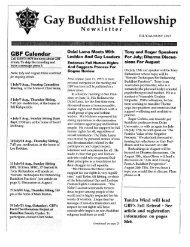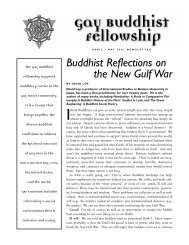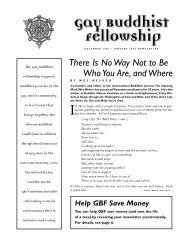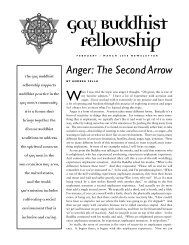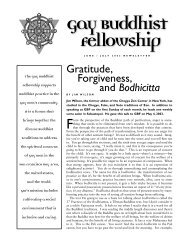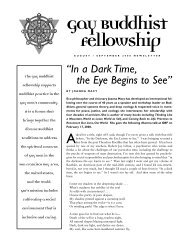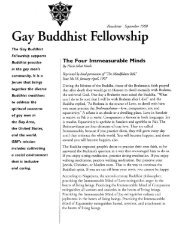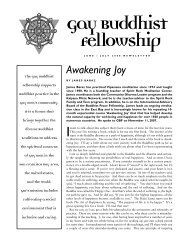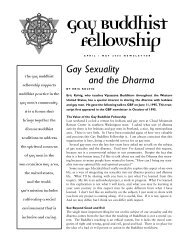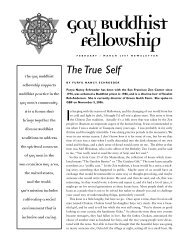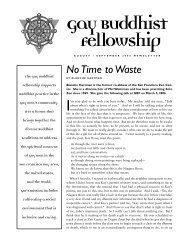Keep squeezing drops of the SunFrom the sacred h<strong>and</strong>s <strong>and</strong> glance of your BelovedAnd, my dear,From the most insignificant movementsOf your own holy body.Learn to recognize the counterfeit coinsThat may buy you just a moment of pleasure,But then drag you for daysLike a broken manBehind a farting camel.You are with the Friend now.Learn what actions of yours delight Him,What actions of yours bring freedomAnd Love.Whenever you say God’s name, dear pilgrim,My ears wish my head was missingSo they could finally kiss each otherAnd applaud all your nourishing wisdom!O keep squeezing drops of the SunFrom your prayers <strong>and</strong> work <strong>and</strong> musicAnd from your companion’s beautiful laughterAnd from the most insignificant movementsOf your own holy body.Now, sweet one, be wise.Cast all your votes for Dancing!So, not to change subject, but I had kind of a nice intellectualsurprise a couple of months ago. I was reading this wonderfulbook by Sarah Bakewell called How to Live, or a Life of Montaigne, akind of biography of the French essayist. Montaigne lived in the17th century in France. And he wasn’t really a philosopher. Ifhe lived today he’d be a blogger. He sat in this tower all dayevery day <strong>and</strong> wrote whatever was passing through his mind <strong>and</strong>left voluminous volumes of journals. And ever since the 17thcentury, he has come <strong>and</strong> gone out of fashion, <strong>and</strong> he’s comingback into fashion now. He’s a lot of fun to read; the guy’s veryamusing. But one of the things I learned reading this book wasthat Montaigne had a classical education, which meant he wasraised in school where they were speaking classical Greek <strong>and</strong>Latin. So there’s a whole section in the book about the Greekphilosophers that he appreciated. I’m reminded that I haven’thad Greek philosophy since maybe my freshman year in college.The classical Greek philosophers that we all know best, tended tobe metaphysicians. The Buddha particularly supports metaphysicalphilosophy, but there was this whole different group ofGreek thinkers that were also called philosophers, but they werereally scientists of life. They were like Montaigne, interested inthe question, “How do you live?” There were three majorschools of Greeks: the stoics, the Epicureans <strong>and</strong> the skeptics,<strong>and</strong> I’m not going to go into detail about all of them, but thesewere the three schools of Greek philosophy that looked at thisquestion of how we should live <strong>and</strong> tried to answer it. They allhad different bents on it, but there’s one general path that they allseem to agree on. Being a dharma person, I really appreciate it.The best path that they seem to agree on to happiness, which inGreek—those of you who are Greek will forgive me my Greekpronunciation—is eudaemonia. The best path to happiness isthrough equanimity. Have you ever heard that before? Thepath to happiness is through equanimity. How do you get equanimity?Equanimity is achieved through the practice of mindfulness.Wow! I always thought the Greeks were diametricallyopposed. I think of rationalism, a kind of fundamental basis forthe whole philosophical Western culture, which is in so manyways different from Eastern culture, as coming from the Greeks.And here I find a bunch of Greeks who were pretty much teachingthe same things as the Buddha was at the same time. In fact,when I talked to one of my dharma teachers about this—I said,“I just discovered the coolest thing about the Greeks”—he taughtme that Hero, who founded the Greek school of skepticism, wasin the entourage of Alex<strong>and</strong>er the Great <strong>and</strong> spent a good dealof time in Northern India at the time or shortly after the time ofBuddha. So there was this cross-fertilization of Western <strong>and</strong>Eastern cultures in 300 BC. So I’m not necessarily saying thatthe Greeks got their ideas from the Buddha, but you knowdharma is dharma, <strong>and</strong> it’s universal. It doesn’t matter who saysThis constant cycle of noticingthings are a little bit wrong—dirtyglasses, bad job, unsatisfactory relationship—<strong>and</strong>trying to eitherturn away from it or grab somethingthat's better, is what's calledsamsara. It's the wheel of sufferingthat we're all on, that we're runningon like hamsters for our entirelives. And the Buddha's teaching,the Buddha's path, is how toget off the wheel of samsara, howto step off the wheel.4 G B F A P R I L / M AY 2 0 1 2 N E W S L E T T E R
it. You get the same thing from Native Americans who had noaccess to the Buddha, but the dharma is the dharma. It reallypleased me to get the same lessons from the Greeks.The motto of the school of the skeptics, Hero’s motto, is “Isuspend judgment.” The skeptics believed that the judgments,for even simple views <strong>and</strong> opinions, were so subjective that theyshould really be kept to yourself because mine are differentfrom yours, <strong>and</strong> if you do share views <strong>and</strong> opinions, you shouldbe deeply respectful of the fact that there’s no such thing as anabsolutely true view or opinion. It’s always subjective. TheBuddha certainly believed this also, <strong>and</strong> taught that one of theprimary forms of craving is views <strong>and</strong> opinions. Our views<strong>and</strong> opinions are something that we attach ourselves to. Theybecome me, mine. They support our sense of self, <strong>and</strong> arefundamentally disrespectful of anyone who thinks otherwise.So I wanted to go off on that idea a little, on views <strong>and</strong> opinions,then get some of your views <strong>and</strong> opinions. We have anelection year coming up. I don’t know about you, but I’mhearing a lot of views <strong>and</strong> opinions. It’s really interesting towatch my own reaction <strong>and</strong> my own stuff come up. You mighthave heard this from me before, but I periodically take newsholidays where I just stay away from the news. I cancel thenewspapers but I still get the Sunday New York Times because Ilike the book review <strong>and</strong> the entertainment section. But thismorning I got my New York Times <strong>and</strong> I started looking at it <strong>and</strong>became immediately pissed off. So after a couple of articlesbecause today I was giving a dharma talk <strong>and</strong> I was trying tobe mindful <strong>and</strong> be in the moment, I needed to put that away.I don’t watch CNN; I don’t watch Fox News. It’s not because Idisagree with everybody but one of the things I notice is that ifyou turn off the sound <strong>and</strong> watch a little bit of Fox News, orCNN, you get the same thing, you get the same message. Youget agitated people talking a lot. So the Buddha didn’t say,“Don’t have views <strong>and</strong> opinions.” He did advocate for what hecalled discernment, so that in any given circumstance, includingpolitics, the Buddha would say evaluate the situation, dowhat you can do, <strong>and</strong> don’t fret about it, because most of thepain that we cause ourselves in politics is purely internal. MichelleBachman doesn’t annoy you. You annoy yourself inresponse to Michelle Bachman. It’s a really useful distinction tolook at in your practice because part of what craving is about isblaming our mood on somebody else: my partner, my job, myMichelle Bachman. Did you notice what came up when Imentioned Michelle Bachman? We all have a response, <strong>and</strong> ina different group, Barack Obama would produce the sameresponse. So what I’m trying to end with, <strong>and</strong> I hope I’m doingthis skillfully, is to get us to pay attention to our response<strong>and</strong> how we create our own suffering by that response, becauseSo the idea is to be able to seeyour own stuff as it comes up <strong>and</strong>not be judgmental of it, to knowthat this is the result of causes ofconditions, <strong>and</strong> you probably hadvery good reason for coming upwith this defense or habit. Atsome time in your life, it servedyou well. But recognize that rightnow it’s not serving you quite aswell, <strong>and</strong> maybe it’s something youcan let go of. If we see it enoughtimes, we can do it.I think there’s going to be a lot of opportunity for creating sufferingcoming up, if it hasn’t already started in this electionyear. It doesn’t have to happen. We can act with discernment.We can do the right thing. We can be engaged <strong>Buddhist</strong>s, butwe don’t have to sit around grinding our teeth.I just wanted to remind you of this before I end. Bill Weberwas here about a month ago, <strong>and</strong> for those who were here, heused a really poignant metaphor that I just wanted to remindyou of. It was a story about the Vietnamese boat people afterthe Vietnam War when they were evacuating people, <strong>and</strong> peoplewere trying to get away, <strong>and</strong> there were hundreds if notthous<strong>and</strong>s of over-loaded boats trying to get out to the Americanwarships, trying to escape. And the boats were all overloadedbecause as soon as a boat would leave the beach, peoplewould swim out <strong>and</strong> climb on it, <strong>and</strong> the boats were turningover <strong>and</strong> people were panicking <strong>and</strong> jumping up <strong>and</strong> down<strong>and</strong> waving their arms. Bill had read a story someplace <strong>and</strong>quoted it here at GBF about someone noticing that if a boathad one calm person on it, just one person not panicking, thatboat was much more likely to make it. That person might havebeen quietly bailing water while everyone else was jumping up<strong>and</strong> down, waving their arms, excited, but if there’s one calmperson in the boat, the merit of their practice impacted everyoneelse on the boat, <strong>and</strong> they were more likely to make it.That story really stuck with me. So I just want to encourage usas practitioners, or <strong>Buddhist</strong>s, or just citizens of the world, totake the opportunity to be the one calm person in the boat forwhatever is coming up. And who knows what’s coming up?GBF APRIL / MAY 2012 NEWSLETTER 5



